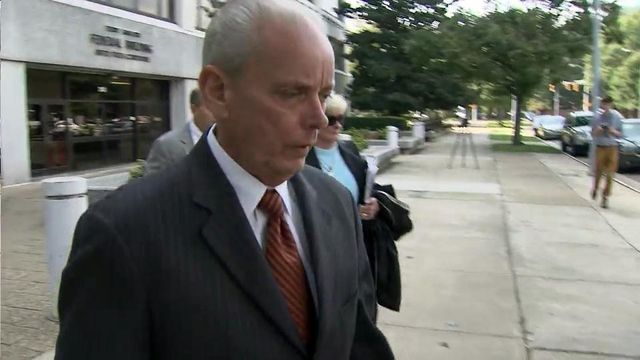Man sentenced to prison for bilking church members
An Indiana man was sentenced Thursday to 22 years in prison for swindling Baptist church congregations out of an estimated $20 million in what prosecutors describe as a Ponzi scheme run out of a Smithfield used car lot.
Posted — UpdatedThomas L. Kimmel, 68, was convicted by a federal court jury in June of mail fraud, money laundering and conspiracy. Chief U.S. District Judge James Dever also ordered Kimmel to pay $16.5 million in restitution to hundreds of victims.
Prosecutors said Kimmel was hired in 2006 by the owners of Sure Line Acceptance Corp., which was the financing arm of Automocion, a Smithfield car dealership. Kimmel used his financial seminars at Baptist churches to promote what he described as risk-free investments to church members, telling them that their investments were backed by the cars and the purchase agreements.
Kimmel didn't tell investors that the Sure Line was losing money, especially after the U.S. economy collapsed in 2008, or that he paid pastors a 1 percent commission to steer business to him, prosecutors said. They said he also overstated his involvement with Sure Line and the activities of a "spiritual board of directors" that he set up to help market the program.
As the economy struggled through the recession, the money Kimmel brought in kept Sure Line afloat, paying expenses and the returns promised to earlier investors, prosecutors said. But the scheme fell apart in 2011 after a third money crunch at the company, when there wasn't enough money coming to pay off everything that was owed.
Prosecutors said 326 people invested with Kimmel, many of them retirees who wound up losing their life savings. He received a 10 percent commission from Sure Line for all of the business he secured.
“Kimmel used his professed spirituality and position of trust as a tool to defraud victims at their churches-the very places they felt the most safe," Assistant U.S. Attorney David Bragdon said in a statement. "From day one, Kimmel told lies to maximize his commissions. He used trust and faith to defraud hundreds of victims, many of whom invested their life’s savings."
Kimmel's wife and other close relatives also invested with him. His sister and brother-in-law, who lost about $500,000 in Sure Line, walked out of the federal courthouse in Raleigh with him after his sentencing Thursday. They insisted that he never lied and called him a good man.
During his trial, prosecutors played videotaped recordings of Kimmel's presentations to various churches, where he promised a 12 percent return and encouraged people to drain their retirement accounts to entrust their money with him.
"The worst words against him was him," defense attorney Woody Vann said Thursday. "I don't mean his testimony. I mean what (jurors) saw on the videotapes."
Vann said Kimmel gave a third of his commission payments to charity, and another third went to taxes.
Prosecutors noted that Kimmel previously worked with Scott Hollenbeck, a former Forsyth County resident who was convicted of fraud in 2008, suggesting that the Sure Line case "is not the first time he was involved with a fraud – only the first time he was caught."
Three other people have already pleaded guilty and been sentenced in the scheme.
• Credits
Copyright 2024 by Capitol Broadcasting Company. All rights reserved. This material may not be published, broadcast, rewritten or redistributed.






